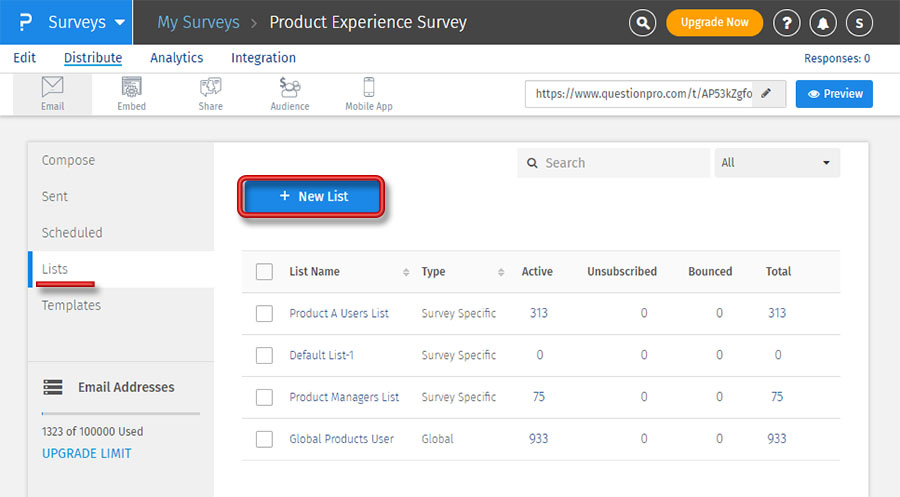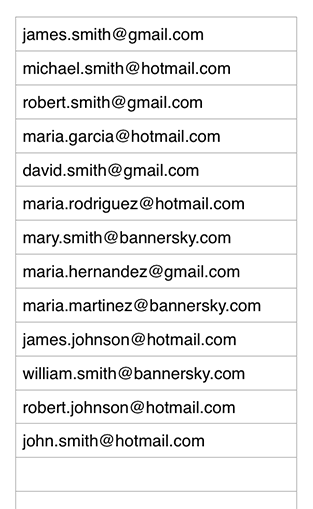When you purchase a pathologist's email list, many important elements must be taken into account to ensure that the information you receive is correct and compliant with all applicable laws, and suitable to your outreach or marketing objectives. Be aware of the following elements: Quality and accuracy of the data
Data source: Make sure the email list service provider collects their information from trusted sources, like professional directories, health databases or opt-in contacts that have been verified. This will help ensure that the email addresses are up-to-date and relevant.
Verification Method: Check that the email address has been checked recently. Providers should establish a procedure to verify email addresses and eliminating non-active or invalid ones. The best lists have lower bounce rates which means they are more efficient in delivering.
Segmentation and Customization: Search for lists which include options like geographic location, subspecialties, years of experience, or affiliation with hospitals. Customization lets you focus your marketing, increasing the likelihood of reaching the correct audience.
2. Legal Regulations
Data Privacy Regulations - Ensure the email list complies to data privacy laws such as the General Data Protection Regulation in Europe and the California Consumer Privacy Act in the U.S.A. Pathologist data needs to be collected in a compliant way, but still respecting individual privacy.
CANSPAM Act - If you're in the U.S.A. and/or are targeting U.S. pathologists make sure your email lists are compliant with. The CANSPAM Act regulates commercial emails. Failure to comply could result in huge fines.
Check to ensure that the emails on the list are those with valid opt-in consent. This will ensure that pathologists have opted-in to receive promotional emails. It also helps reduce the chance of complaints regarding spam and maintain your company's good name.
3. Provider Reputation
Credibility of the Provider Choose a company with an established track record of sending accurate and compliant email lists. Check reviews, testimonials, or references to assess the reliability of a product or service.
Transparency: The service provider must be transparent about their data-gathering methods and the frequency with which the data is updated. Beware of companies that are ambiguous in regards to the sources of their email list.
Customer Support - Find firms that provide strong customer service in the event technical issues arise or you need help with your task.
4. Cost and Return on Investement (ROI).
Pricing Model: Consider various pricing models, including pay-per-contact, a flat-fee for the list or subscription models. Check if the cost is within your marketing budget and the potential ROI.
Refund policy: Some companies offer refunds or guarantee replacement if a significant number of emails is invalid or doesn't meet the requirements promises. Make sure that the provider has a clearly-defined return or exchange policies.
Value for money - Examine the price of a list with its quality, degree of segmentation and other services (e.g. Campaign management or CRM Integration). It is possible that the most affordable list may not be the most effective, if poor deliverability results.
5. Ownership, Usage, and Access
Licensing Rights and Usage Rights Clarify whether the list will be used just once or if you'll be able to use the list to run campaigns. Some providers provide an exclusive license and others allow unlimited use. The latter can be better suited to long-term campaigns.
Exclusive vs. Shared Lists: Find out if the email list is only for you or shared with other buyers. Exclusive lists could lead to greater engagement since the contacts will not be bombarded with multiple sources.
6. Data Integration and Format
Integration with CRM/Email Marketing Tools Make sure that your email list can easily be integrated into your CRM or email marketing tools. The data must be supplied in a widely-used format, such as CSV or Excel. It can then be easily imported.
Data Segmentation: Examine how easy it is to sort and filter the data once it's integrated. Effective segmentation can result in personalized mailers, which generally have higher open and response rates.
7. Ethical Considerations
Pathologists are highly skilled and have a lot of specialization. Make sure that your message products or services are relevant for their needs. Sending irrelevant information can damage your image as a brand and could cause complaints about spam.
Beware of Spam Avoiding Spam: Sending out too many emails or unwelcome content could result in spam reports. Make use of the list in a responsible manner to prevent a negative impact on your reputation.
The final sentence of the article is:
If you are doing it correctly, buying an email list of pathologists could be a very powerful marketing tool. Prioritize data compliance, provider reputation, and quality of the data to maximize the potential of your list. Be sure the list is tailored to your particular requirements and that you adhere to rules regarding data privacy and ethical marketing practices. With these considerations and ensuring that you are able to design efficient and effective email campaigns targeted at pathologists. View the recommended pathologist email list for more tips.

What To Look For When Purchasing An Email Database Within The Oil And Gas Industry
To create a top-quality list that is targeted and in compliance with the law, be aware of a number of aspects. Here are 10 important things to keep in mind:
1. Relevance of the Target Audience
Check to see if the email list only targets the natural gas and oil industry. The list should be segmented to include professionals, like geologists and engineers, managers and decision makers in midstream, upstream as well as downstream operations.
Search for the correct key decision-makers (executives and managers, engineers etc.). within the companies you wish to focus on.
2. List Source and Vendor Reputation
Reputable providers: Only buy from trusted and reputable email list providers that adhere to the most effective practices for collecting data. Avoid purchasing from companies with questionable provenances. They could be afflicted with bad quality data or, even more important, legal problems.
Data Qualitative: Reviews or testimonials are used to determine the reliability and quality of the list.
3. Quality, Freshness, and Accuracy of Data Quality
Data Age: The database must be updated with the most recent information about contact details. Oil and gas companies frequently undergo personnel changes, and insufficient contacts can cause a high bounce rate.
Verification Process - Ensure that your vendor is constantly updating and verifying their contact list in order to eliminate any inaccurate or non-responsive names.
4. Compliance with Regulations
Legal Compliance: Ensure that the list is in line with local and global laws such as GDPR, Can-SPAM, and others that govern the use of personal information. Non-compliance can lead to criminal penalties or legal risk.
Opt-In Process: Check if the email addresses in the list were collected with consent. This means that they had chosen to receive communications.
5. Segmentation and Customization
Custom Segmentation: A reputable list provider should offer options for segmentation based on specific aspects like location, job role, company size, or sub-sectors in the oil and gas.
Custom Filters. Based on what the objectives of your campaign are you might want to customize the list by including criteria such a geographic area, company size, and particular requirements.
6. Rate of Deliverability
High Deliverability: A good email list will send emails at a rate of 95% or more. Low-quality lists often contain high bounce rates which can damage your sender's image and marketing efforts via email.
Request previous data or statistics on delivery to gauge the effectiveness of an itemized list.
7. Volume Vs. Qualitative
Quality over Quantity: Make sure the list isn't only big in terms of volume, but also highly targeted and precise. A shorter, more specific list will produce better results.
Engagement Metrics: Prioritize engagement rates over the number of contacts as an engaged audience will be more likely to respond to your campaigns.
8. Cost structure and pricing
Transparent Pricing: Know the pricing structure of the list, whether it's a once-off purchase or subscription-based. Be wary of lists that are extremely low priced, since they aren't necessarily of the highest quality or offer any value.
Return on Investment (ROI) You should consider the possibility of a return on investment by comparing the list price with the expected conversion rates. It is sometimes more cost effective to pay more for a list with a high conversion rate.
9. Privacy of Data and Security
Verify that the seller follows strict guidelines for data protection. The list provider must make sure that all personal information is protected from intrusion by unauthorized persons.
Privacy: Make sure that the company does not share or sell your data, especially in cases where your business needs privacy and discretion.
10. Customer Service and After-sales Support
Customers should receive ongoing support from the vendor in the event you run into problems or need assistance with the implementation.
List Replacement: A reliable list supplier will offer either a refund or replacement in the event of any problems with the list.
Consider these factors to ensure you're purchasing an oil and gas email list that is reliable, efficient and in line with your goals for business. Check out the expert oil and gas industry email list for site advice.
